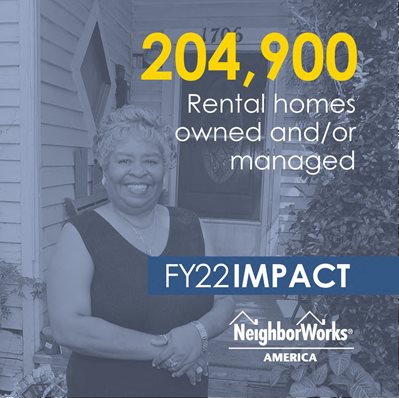NeighborWorks America released new impact data showing just how much of a difference the organization and its network are making in the field of affordable housing and community development. While the data reflects nationwide housing trends — including a limited inventory of homes and higher home prices — it also shows an increase in the number of homeowners preserved and an increase in the number of rental homes in the network.
"Since fiscal year 2010, NeighborWorks America has collected address-level data for clients and homes," says NeighborWorks' Vice President of Business Intelligence Michael Butchko. "We feel we have a responsibility to reflect that back to the network, so they can have conversations about where NeighborWorks network organizations are doing the work."
 A highlight of this work includes the NeighborWorks network's rental portfolio surpassing 200,000 for the first time ever in 2022. "The rental units passing 200,000 is incredibly significant," Butchko says. "When I first joined NeighborWorks in 2000, we were not known as a network that had significant rental housing. I remember the days our rental portfolio was in the tens of thousands. But now, in the state of California alone, we've passed 40,000 rental units — about a fifth of our portfolio."
A highlight of this work includes the NeighborWorks network's rental portfolio surpassing 200,000 for the first time ever in 2022. "The rental units passing 200,000 is incredibly significant," Butchko says. "When I first joined NeighborWorks in 2000, we were not known as a network that had significant rental housing. I remember the days our rental portfolio was in the tens of thousands. But now, in the state of California alone, we've passed 40,000 rental units — about a fifth of our portfolio."
Butchko adds that this speaks to the need that NeighborWorks network organizations in California — and many network organizations across the country and Puerto Rico — are fulfilling. And it affirms an early success in NeighborWorks America's strategic plan, a goal of which aims to create, preserve and invest in affordable homes and wealth building.
As with many things, however, data isn't solely about showing off successes. Through the FY22 impact data, Butchko noted that the total number of new homeowners created declined to 18,775, but that this is part of a steady decline in new homeowners since 2019.
"That's consistent with what we saw in the housing market during the pandemic," Butchko explains, "but last year, we saw a significant decline. If you think of the challenges of home prices and the increase in interest rates, it's harder for the people that NeighborWorks network organizations work with to achieve homeownership."
Which is why opening pathways to homeownership remains a key goal for NeighborWorks and its network.
"When you think of challenging economic conditions over the last year — inflation, high housing costs, the pandemic still hanging over us — for families to have reliable, safe, affordable housing, for there to be 205,000 units nationwide that are going to be consistent in the monthly rent and be safe and decent, it speaks to the stabilization that families really need right now," Butchko says.
And that's reflected in the data, too.
"We've seen an increase in clients reported with rehabilitated homes. It seems to support the belief that people aren't moving. They're investing in their homes so they can stay. What we're seeing from the network reflects that."
View the FY22 impact map, which features data from NeighborWorks network organizations on a national and state level.
03/23/2023

